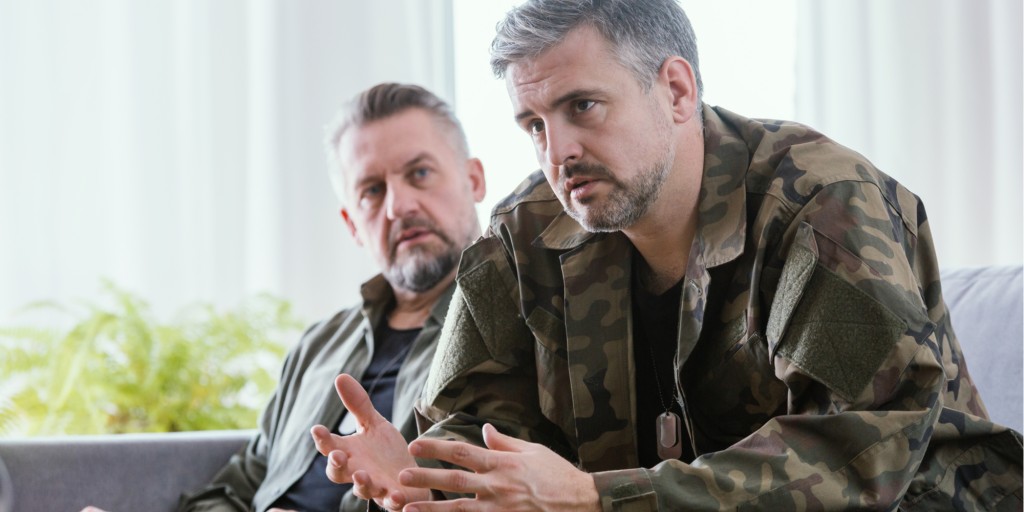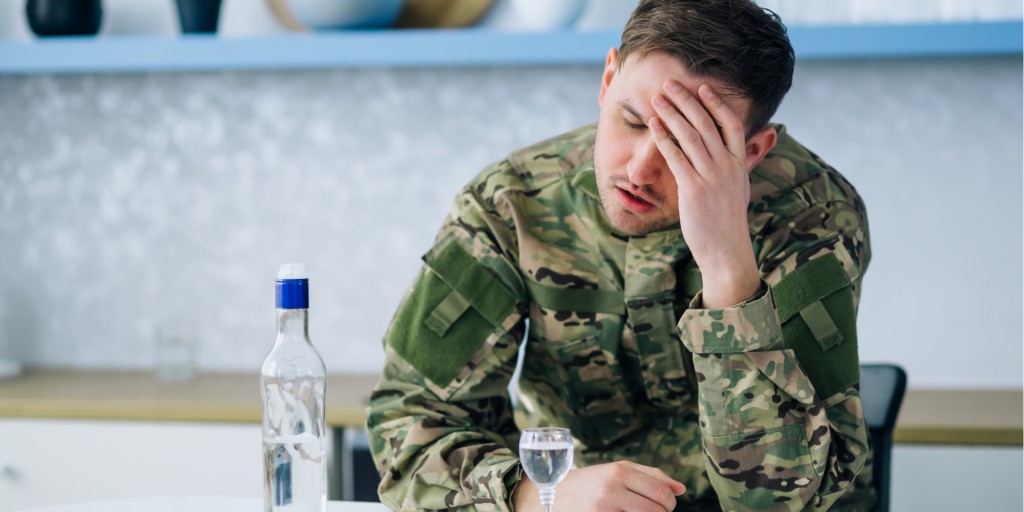
Did you know that veterans in recovery have unique needs that civilians don’t? This is partially due to the unique experience of being a veteran, but it’s also tied to underlying mental health issues like post-traumatic stress disorder (PTSD), depression, and moral injury. All of these contribute to the fact that veterans are more likely to abuse alcohol and other addictive substances. And a culture of self-reliance and pride can make it especially hard to seek support from other veterans in recovery.
But when veterans come together to quit drugs and alcohol, these hurdles can be overcome. In fact, one study into peer-to-peer veteran support found that having support from a fellow veteran with mental health training helped individuals drastically improve their health. Keep reading to learn how veterans helping veterans can make all the difference in addiction recovery.
Table of Contents
How Addiction Affects Veterans in Recovery


There are many ways that addiction can start in veterans. Some people start using during their time in the service. For others, they only turn to substance abuse after they return home and find that they can’t connect to the people around them as easily. But however veterans come to develop a substance use disorder, it brings a lot of challenges.
Some of these challenges are universal, like how taking drugs or alcohol becomes more important than work, relationships, and other interests. But others can be more specific to the veteran’s situation and their addiction.
For example, a veteran who drinks to deal with PTSD symptoms may be able to hide their addiction for a while under the guise of being a casual drinker. Because alcohol is so culturally normal, they can drink in public without anyone recognizing the signs of addiction. Moreover, since they’re drinking to deal with a mental health issue, any unusual behaviors can be justified as a result of drinking, which can let the problem continue on for longer.
On the other hand, a veteran who becomes addicted to opioids as a result of a combat injury may have a different experience. Loved ones may keep a closer eye on them, which could result in either earlier addiction treatment or forcing the veteran to hide their behaviors. If the veteran feels the need to hide, they may turn to substances like heroin and fentanyl, which can cause even more problems in their life.
Clearly, there is a lot of variance in veteran substance use disorders. But the important thing is that veterans have one unifying shared experience—their service. And this starting place makes all future addiction recovery possible when veterans in recovery work together.
Veterans in Recovery Know What You’re Going Through
When veterans find themselves at civilian addiction treatment centers, they often find that the care is not what they expected. This isn’t because civilian rehabs are bad, but because veterans have unique experiences that civilians often struggle to relate to. And without that foundation of understanding, it can be particularly hard for veterans to open up.
Take, for example, post-traumatic stress disorder. This mental health condition is a common cause of alcohol and drug abuse in veterans. And while anyone can develop PTSD, in veterans it is often caused by situations that civilians cannot relate to, like combat exposure. This creates a gap between veterans seeking help and both support staff and other people in recovery.
But when military personnel are surrounded by other veterans in recovery, there is no divide. Through shared experiences, veterans can help each other in dealing with mutual issues stemming from their military service. And that can include a lot of issues, like:
- Trouble finding or keeping work
- Difficulty maintaining relationships with family and friends
- Financial issues
- Adjusting to civilian life
- Intense cravings from drugs and alcohol
Clearly, there are many areas of life that are affected by addiction. And working with other veterans in recovery can do a lot of good in facilitating recovery through common ground. But how do you get in touch with other veterans who have quit drugs and alcohol?
Drug and Alcohol Addiction Treatment for Veterans


If you’d like to meet with other veterans in recovery for communal support, the best place to do that is at a veteran rehabilitation center near you. And at Heroes’ Mile in DeLand, Florida, we connect veterans in recovery at every stage of addiction treatment, from medical detox to residential rehab to outpatient programs.
Addiction is always a personal experience, but having people around you who have similar stories can make all the difference. At our veteran-exclusive rehab, we have many veterans on staff so that you have plenty of opportunities to work with veterans in recovery, both those who are in the earlier stages and those with years of sobriety. In this way, you can draw on a variety of veteran experiences to give yourself the best chance for long-term recovery.
Would you like to learn more about how we help veterans in recovery? Call our admissions specialists at 888-838-6692 or submit your questions through our confidential contact form. Whatever you’re dealing with, there are veterans who have gone through the same thing, and they’re waiting to help you find the path forward to sobriety.
The post How Veterans in Recovery Stay Sober Through Peer Support appeared first on Heroes’ Mile Veterans Recovery Center.
Source
Original Author: Heroes’ Mile

